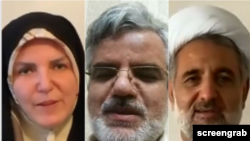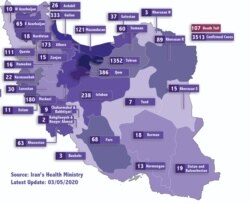Reports of the coronavirus infecting members of Iran’s establishment have angered Iranians, with some dismissing the infections as fake, and others accusing elites of monopolizing access to medical testing.
Deputy Parliament speaker Abdul Reza Misri said Tuesday that 23 of Iran’s 290 lawmakers had the virus, a big jump from the handful who posted online videos in the preceding week saying they were infected. Misri did not provide a full list of the infected lawmakers’ names.
Iranian state media have said at least a dozen other prominent government and religious figures also have tested positive for the virus since late February, most notably Masoumeh Ebtekar, vice president for women and family affairs.
They said several of them died of the COVID-19 disease caused by the virus, including Mohammad Mir-Mohammadi, an adviser to Iran’s supreme leader, Hadi Khosroshahi, a former ambassador to the Vatican, and Hussein Sheikh al-Islam, an adviser to Iran’s foreign minister.
Iranian news sites announced the death of Sheikh al-Islam, another former diplomat, Thursday.
Iran’s health ministry said the national death toll from the virus rose to 107 out of 3,513 confirmed cases Thursday, compared to 92 deaths and 2,922 cases the day before. It also said it had detected the virus in all 31 Iranian provinces for the first time, with Bushehr being the last province added to the list.
Some Iranians, suspicious of their government after it admitted to falsely denying responsibility for the accidental downing of a Ukrainian passenger jet in January, have used social media to accuse officials of misleading the public again, this time about the severity of the outbreak and how it has affected the ruling political and religious elites.
In calls to the Wednesday edition of VOA Persian’s "Straight Talk" show, some viewers in Iran said they suspected that at least some establishment figures were pretending to be infected with the coronavirus.
“They lie about those Iranian officials who are suffering from COVID-19,” said a man who identified himself as Amir. “They just want to show that (the virus) is not a big deal and we are all in it together.”
A woman named Bahar who said she was calling from the northern city of Karaj told "Straight Talk" she considered it strange that so many Iranian officials declared themselves to be infected with the virus.
“I guess it is just a gesture to say, 'We stand with the people,'” she said.
VOA could not independently verify the callers’ identities.
Iranian global health scholar Kamiar Alaei, co-president of the Institute for International Health and Education in Albany, New York, told VOA Persian that suspicions of Iranian officials pretending to have the virus are “completely understandable” in light of public distrust toward the government.
“But it is hard to verify that, and I don’t think everybody has pretended,” Alaei added, pointing to the deaths of some of the infected establishment figures.
Alaei said several factors appear to have contributed to the spread of the virus in Iran’s ruling circles, such as establishment figures potentially being in contact with travelers from China, a key Iranian economic partner that has seen the world’s worst coronavirus outbreak. Iran and China have maintained air links in recent weeks.
Alaei said other contributing factors include frequent travel by political and religious figures to Qom, the Iranian holy city where the virus has had the severest impact, and the custom of greeting people with kisses to the cheek, a type of close contact that can spread the virus.
Iranian social media users also have complained about the apparent ease of government and religious leaders getting access to the nation’s limited medical testing resources, and the speed with which some of those figures have received the results of coronavirus tests.
In a Feb. 26 tweet, Iranian health ministry spokesman Kianush Jahanpur said the number of labs approved for diagnosing the coronavirus had increased from two to seven. He promised that the total number of operational labs would be expanded further to 22 by this week.
A day earlier, Mahmoud Sadeghi was the first Iranian lawmaker to declare that he had contracted the virus in a video posted to Telegram.
Two more Iranian lawmakers later made similar announcements.
Mojtaba Zolnour posted a Twitter video Feb. 27, and Masoumeh Aghapour Alishahi posted an Instagram clip Feb. 29.
Iranian Parliament spokesman Asadollah Abbasi told state media Saturday that 100 lawmakers had used the nation’s limited number of labs to test themselves for the virus and the rest would follow.
“They did very proactive testing on members of Parliament, senior officials and their family members,” said Alaei. “Testing is not recommended for people who don’t have symptoms or haven’t had close contact with infected people. It makes the tests less available for those who may be in immediate need, such as already hospitalized patients.”
Alaei, who earned international acclaim for his past work in Iran fighting HIV/AIDS, said he had seen reports last week of Iranian doctors sending samples to the coronavirus labs and not receiving results.
In one sign of delays in Iranian labs providing test results to non-establishment figures, a 25-year-old hospital nurse who died of respiratory problems in the northern province of Gilan on Feb. 25 was only confirmed to have had the virus on March 2, six days after her death.
The East Gilan Nursing Group announced the positive test result for Narges Khanalizadeh, who had worked as a nurse at Milad Lahijan Hospital in the town of Kalachai, in a March 2 Telegram post. Some Iranian social media users reacted with outrage to the delay in confirming that Khanalizadeh had the virus.
One Twitter user who identified as Babak and based in Tehran posted a montage of photos of tributes to Khanalizadeh, along with a message lamenting a perceived inequality in access to medical testing.
"Due to the lack of the (medical testing) kit, the result of the coronavirus test for the nurse is declared positive seven days after her death. Yet an official of the country gets a fever at 8 a.m., gets a positive test result at 10 a.m., is quarantined at noon, and tweets about his health at night," the Twitter user wrote.
This article originated in VOA’s Persian Service, in collaboration with VOA’s Extremism Watch Desk.





